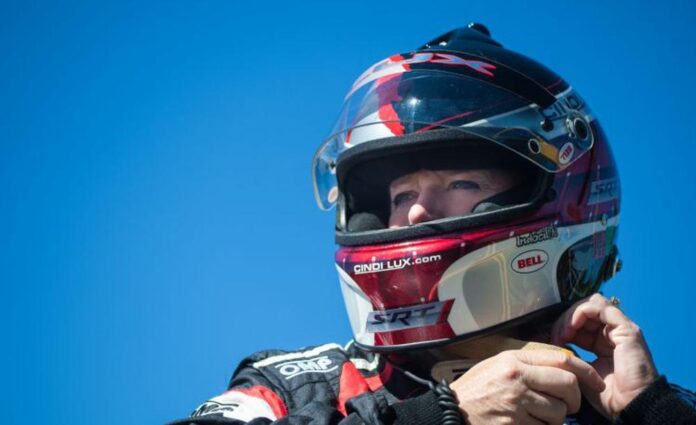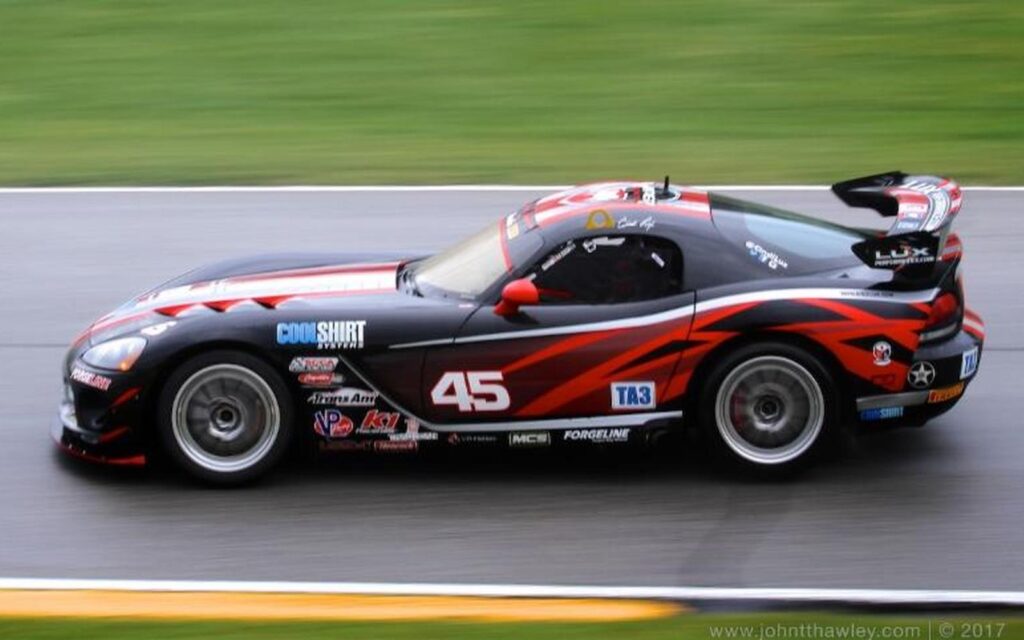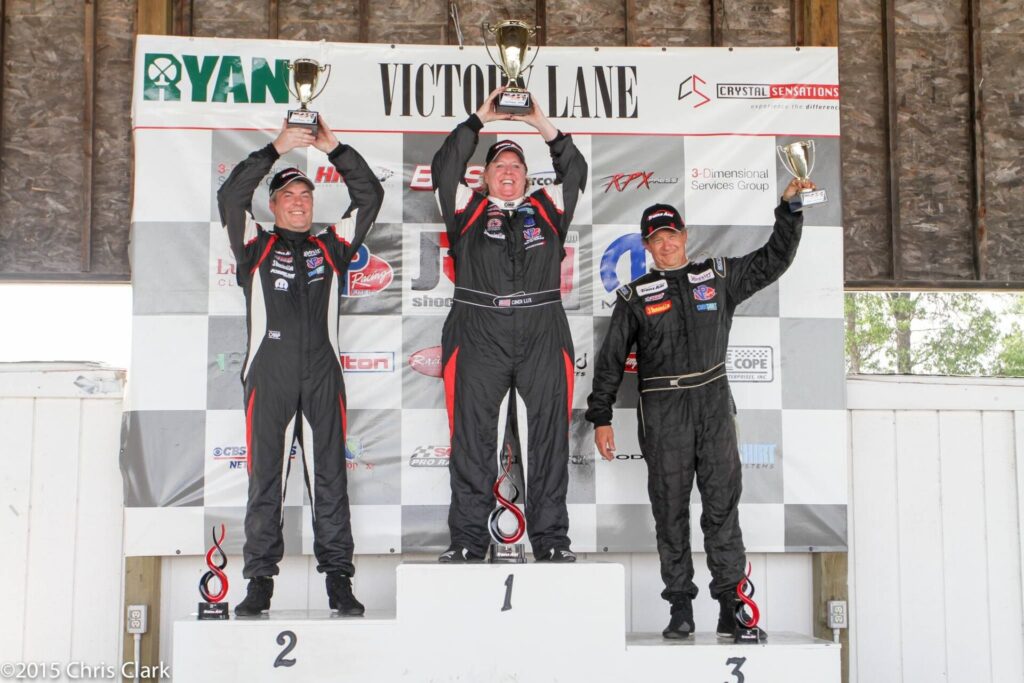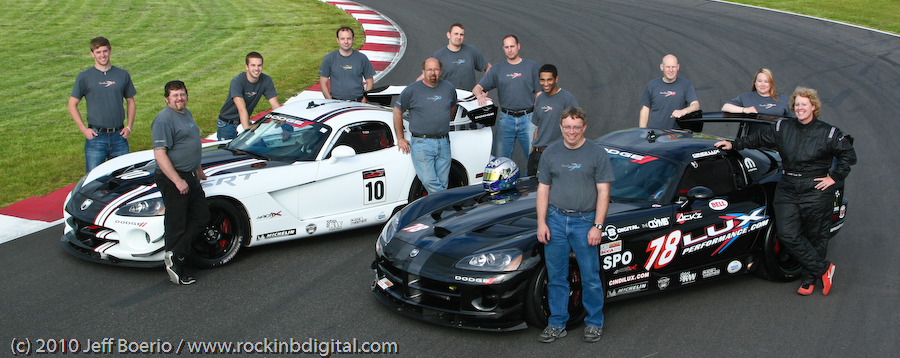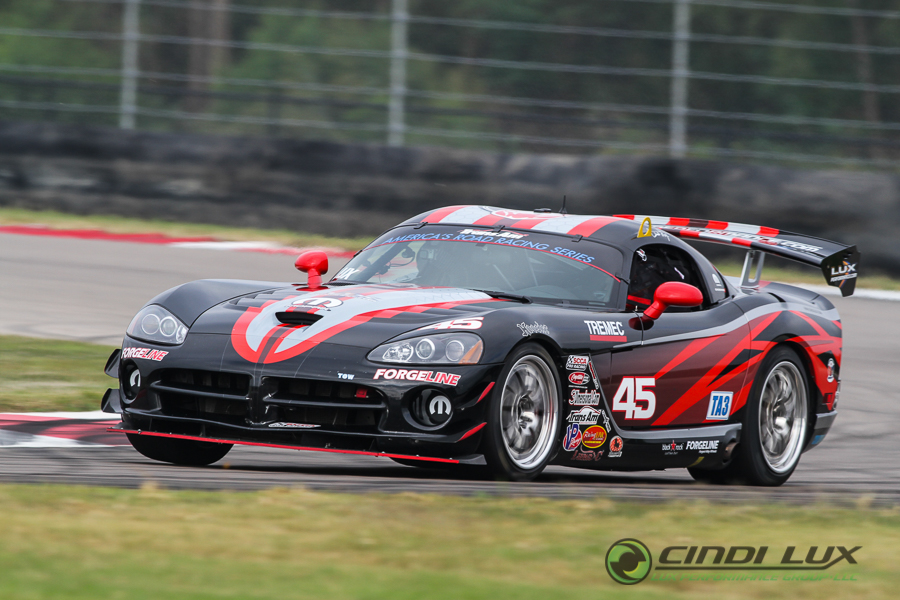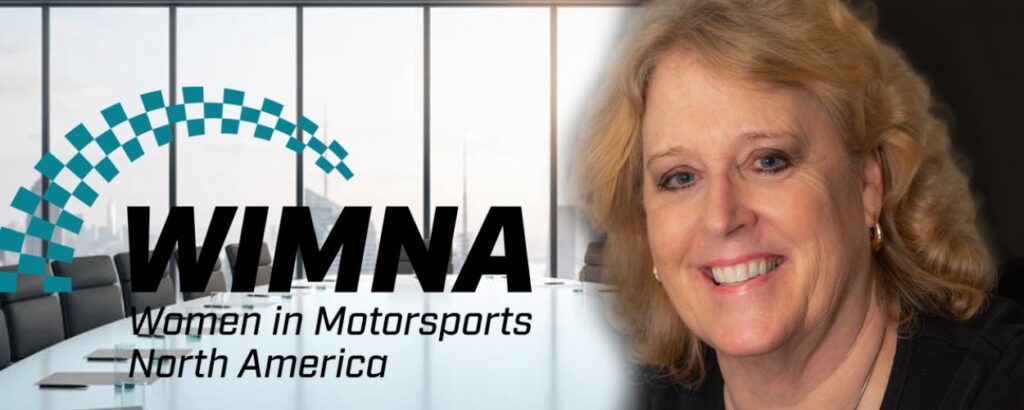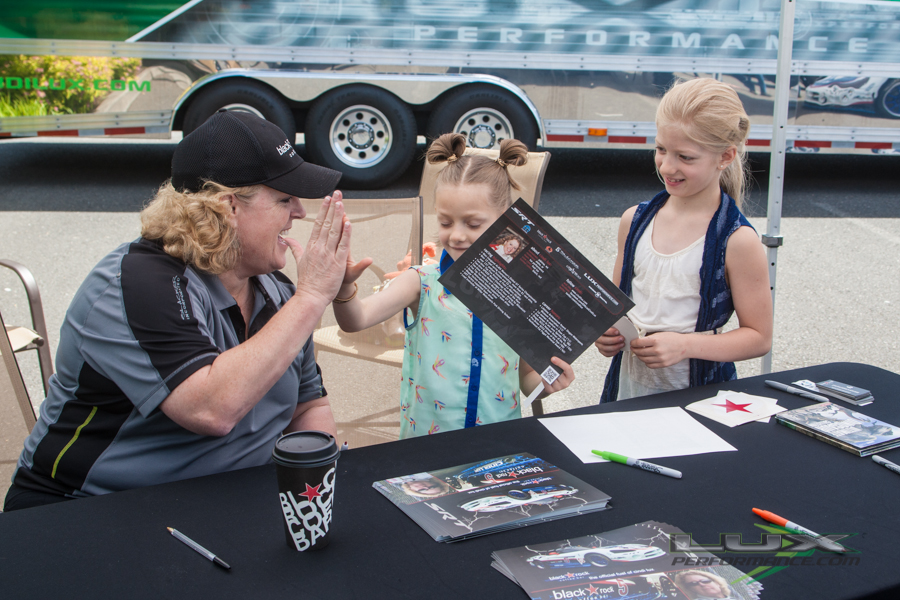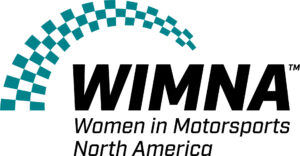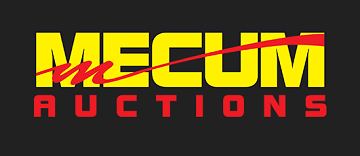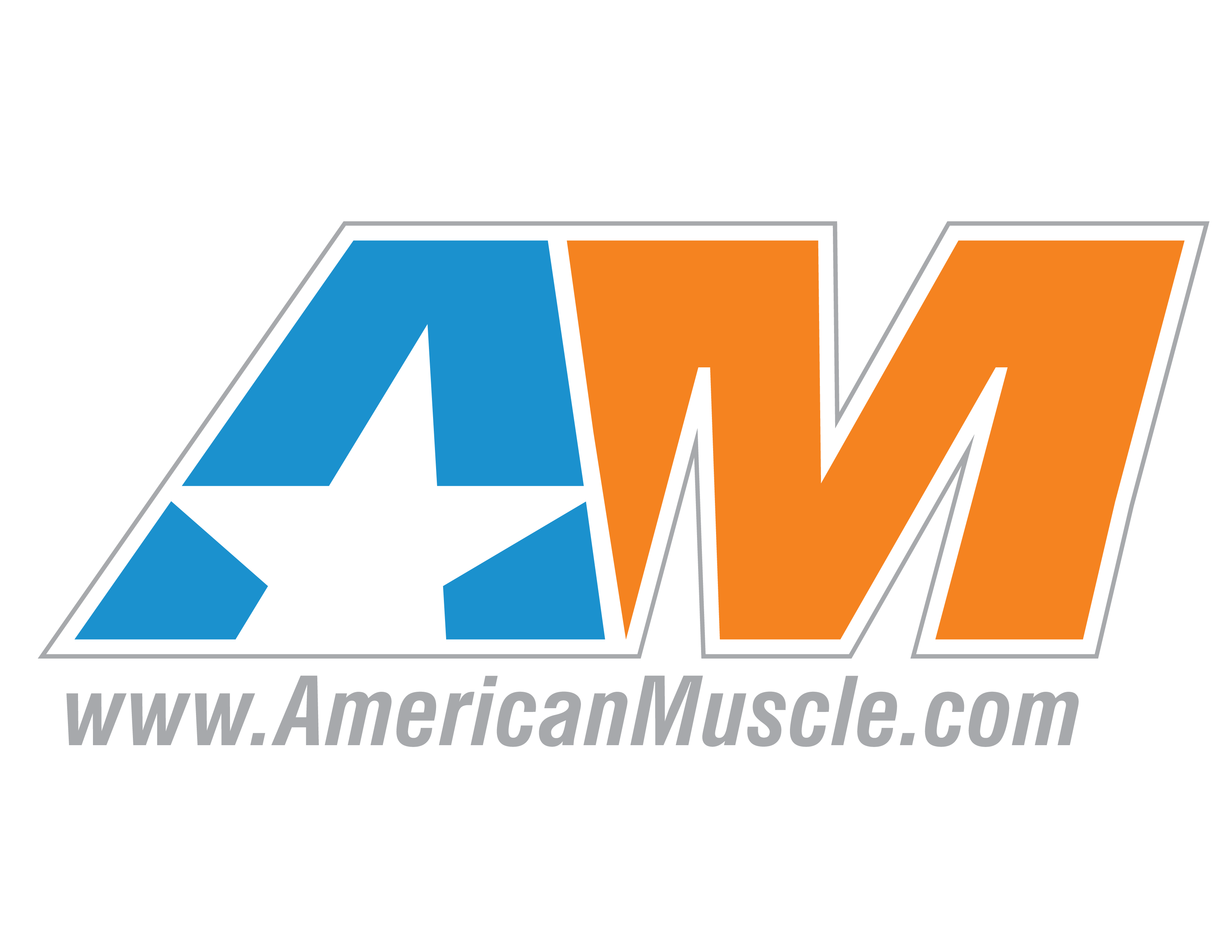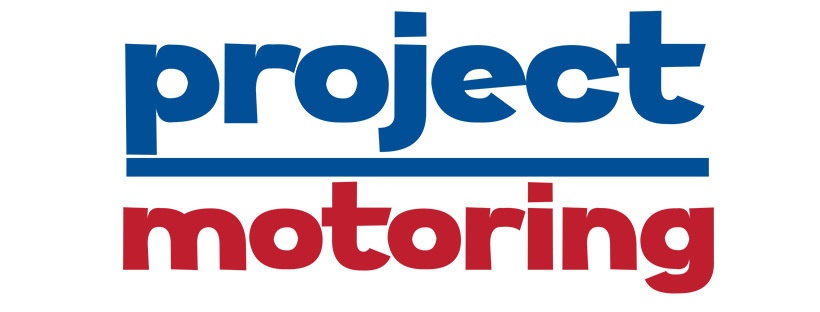Our guest has won 14 road racing championships, more than 90 victories, over 170 podium finishes and more than 55 pole positions. Included in that accomplishments like being crowned the first ALMS Women’s Global GT Series Champion, she was a Dodge Motorsports Team Driver, Completed in World Challenge, A NASA Bronze and Silver Medalist, as well as the 2nd woman in History to win the SCCA June Sprints… TWICE!.
She’s dedicated, fast and fearless; Cindi Lux is recognized as one of North America’s most talented and versatile drivers. And she’s here with us on Break/Fix to share her story!
Spotlight
Cindi Lux - President for Lux Performance Group

Has won 14 road racing championships, more than 90 victories, over 170 podium finishes and more than 55 pole positions

Contact: Cindi Lux at cindi@cindilux.com | N/A | Visit Online!![]()
![]()
![]()
![]()
Notes
- Let’s talk about The who/what/where/when/how of Cindi – how did you get into Motorsports? Did you come from a racing family? Something you picked up as a hobby or by way of friends?
- Who were the women at the time, as you were starting out that inspired or helped you build a career in motorsports.
- What was your biggest oops moment (“code brown”) and what did you learn from it?
- Let’s talk about the good, the bad and indifferent of racing – the business side of things
- We had LSJ on the show in Season 3, to tell her story and share about WIMNA – talk about your role in the organization, how you’ve seen it grow, and its involvement in the motorsports community, but the good it’s also doing for ladies in the sport.
and much, much more!
Transcript
[00:00:00] BreakFix podcast is all about capturing the living history of people from all over the autosphere, from wrench turners and racers to artists, authors, designers, and everything in between. Our goal is to inspire a new generation of petrolheads that wonder. How did they get that job or become that person?
The road to success is paved by all of us because everyone has a story. The following episode is brought to us in part by the Women in Motorsports North America, a community of professional women and men devoted to supporting opportunities for women across all disciplines of motorsport by creating an inclusive, resourceful environment to foster mentorship, advocacy, education, and growth, thereby ensuring the continued strength and successful future of our sport.
Our guest has won 14 road racing championships, more than 90 victories, over 170 podium finishes and more than 55 pole positions. Included in that are accomplishments like being [00:01:00] crowned the first ALMS Women’s Global GT Series champion. She was a Dodge Motorsports team driver, competed in World Challenge.
She’s also a NASA bronze and silver medalist, as well as the second woman in history to win the SCCA June sprints. Twice. She’s dedicated, fast, and fearless. Cindy Lux is recognized as one of North America’s most talented and versatile drivers. And she’s here with us on Brake Fix to share her story. And with that, let’s welcome Cindy to the show.
Hey, thanks. Thank you very much. I appreciate this. This is going to be fun. Well, like all good Brake Fix stories, there’s always a super heroine origin. So let’s talk about your background. How did you get into motorsports? Did you come from a racing family? Did you pick it up as a hobby? Was it by way of friends?
I came from a racing family. My grandfather raced the Pan America Road Race, USA down to Mexico. My father raced Ferrari Testarossas and a whole variety of stuff. And then my two brothers raced also. One is a drag racer and the other’s a road racer. But the key thing is actually being the youngest girl in the family.
I was never allowed [00:02:00] to go to the racetrack. I never really was a part of it. I grew up showing horses. I grew up doing other stuff. I was quite a bit younger than they were. It’s in the family, but no, I didn’t go the traditional route of kind of hanging out at the racetrack as a young kid, watching everybody race and stuff.
And so it really wasn’t until I graduated from college. Grew up out here in the Northwest and graduated and I don’t want to say unmotivated, but I took a couple months off and just went skiing and used the rest of my savings account for after graduation. And then I knew I liked cars, but again, I didn’t want to go to work for the family dealerships.
I think our first dealership was back in 1924 and my brothers were all in the family business. But again, I didn’t want to. going with that. So I graduated from college and then I actually, you know what, I want to try the corporate world. I took a flight down to Torrance, California, and that’s when all the imports, Toyota, Honda, Nissan, and all that stuff were done in Southern California.
And I just went down there and just dropped off some resumes and hung out at the beach for a little bit. On the way back to the airport, I got a phone call. I said, Hey, come back for an interview. I kind of got into the automotive aspect that way. Went to work for Toyota Motor Sales and then went to the Long Beach Grand Prix.
And I was [00:03:00] like, you know what, this is kind of cool. My family does some of this. Living down in California, I didn’t know anybody, lived in an apartment. Started talking to people and no shop, no nothing. And I was like, this is actually pretty cool. And went out and bought a race car. I maxed out 14 credit cards to get the cash to do it.
And what was that first race car? It was a Dodge Shelby Charger, like the old L body. The thing was a hunk of junk. It really was, you know, but it was the only thing I could afford. I look back on it now and I truly, I don’t know what I was thinking. I really, really don’t because I legitimately went down and read another U Haul.
Trailer to pick it up and I brought it back and I found a storage places. I can kind of stuff cars into. And again, I’m like, I don’t know what I’m doing. I was going to load it and then I’ll figure it out later. And that was back in 1987 when I was living down in Los Angeles and then kind of one thing led to another.
And it’s a weird story. I mean, even my family are just like. You’re just weird, you know, like, I know, I know with your brothers influencing you and even your dad having a background in racing, but it also sounds like there was a mixed set of disciplines in there. How did you [00:04:00] settle on road racing versus maybe circle track or dirt or something else?
There’s so many other disciplines of motorsport. What drew you to road racing? I didn’t really know there was other forms out there other than roads racing. You know, when I went to the Long Beach Grand Prix at that time, when there was still callback, I just thought everybody turned left and right. I was really pretty ignorant to the world of motorsports a little bit, but I was fascinated by sport.
I mean, I ski raced. I did martial arts competitively. I was on the swim team. I played on the tennis team. So I have a very much of a competition background. When I went there to the Long Beach Grand Prix, I was like, yeah, this is, this is kind of cool. I’m going to go figure it out, you know, saved up my nickels and went to the school up in Willow Springs, California.
And, you know, again, I had, I had no business doing this. I really, really didn’t. But again, you know, here sat this race car. I went and bought and I had again, no tools, no crew, nothing. One thing kind of just led to another. I started meeting people and they kind of probably felt sorry for me more than anything else.
At that time in the eighties. There weren’t, let’s say, too many other women out there racing, especially in SECA and amateur racing, things like that. There’s some names that [00:05:00] come to mind, and we’ll talk about them as we go along. Were you starting to hear, oh, she reminds me of so and so, or oh, you know, other drivers like this and that and the other?
Were you starting to see maybe some other women in motorsport that you could look up to some other stories that you could pull from? No, I wish I could, you know, I was out there on my own trying to do this thing. And luckily the men, you know, the other drivers and stuff, I think they kind of more admired the fact that I was out there trying, even though I was fumbling over things, I didn’t know what I was doing.
And I think they kind of, I don’t want to say took pity on me, but they kind of say, Hey, if you’re going to do this, you know, you need to at least be safe and put some air in your tires or, Hey, you need to kind of do this. Oh, really? I didn’t, you know, again, I was about as new. But when I told my family I was doing this, they were all very supportive.
This is fantastic, this is great, but you need to learn it on your own. My dad was very old school. He’s like, you know, I raced for a lot of years. You know, if you’re going to do this, you’re going to learn to do it on your own. At first, I was kind of like, geez, dad, you know, everybody else kind of gets help a little bit from family and Now looking back on it, I’m very blessed because he taught me the business side of racing a little bit [00:06:00] more and have to kind of put my big girl panties on and go figure out how to get it done without someone just sitting there stroking a check or making my life easy and stuff.
I mean, the family is very supportive, but did they go out to the racetrack with me? No, not at all. There weren’t a ton of, let’s say organizations like exists today, like high performance driver education groups, HPDEs, you kind of jumped into a Barber or Roosbertal or one of these schools, and then you went club racing, right?
Or you, you went into the pro am circuit or something like that. It’s really trial by fire. And when you’re learning like that, there’s a lot of learning moments, you know, shadowing other drivers, things like that. You’re picking up their lines. What was your biggest, what we call oops moment or code Brown.
And what did you learn from it? I just knew I wanted to do it. I was just every weekend trying to get out there and just learn from others. I think the biggest thing, I think when some of my couple of other competitors that drove the same car, when I was being lapped, probably by lap number two, during a race, kind of came over and said, okay, if you’re going to do this, we need to kind of get you up to speed a little bit more because it’s embarrassing you driving this [00:07:00] car the same as ours.
And you’re pathetic slow. And they said, Cindy, it’s not the car right there. It really was kind of an aha moment in terms of, well, if you promised me my car’s fast, Then I will learn, I will get the help, I will figure this out, I will become a student of the sport to figure out what it takes behind the wheel to make a car fast.
Right when I was beginning is when Riverside Raceway kind of closed down, I was at that event and that’s where I honestly I was like I said lapped in lap number two and I think it was the factory Shelby team that was there racing the same body style cars as myself. They said, give us the car for a couple of hours.
They went through it. They kind of changed some stuff. They put one of their drivers in it, sitting on the racetrack. It went ungodly faster than I ever did. This was before the world of data. This was before the world of other things. But at that point I said, I was excited because I knew it was up to me.
The car was good. And so it kind of inspired me. And I think that’s where, you know, like I said, I grew up on a farm, raised animals and did a lot of horse showing and competition and you got to learn how to do things right. I just got fascinated. Well. It’s me that’s kind of a wanker right now. You know, it’s me that’s not being able to figure this [00:08:00] out.
So, all right, let’s get to work. And so from there, I just studied as much as I could. I went to every single event to watch and talk to people. I wasn’t racing myself. I just volunteered and hung out and just watched. And, you know, I was just a big sponge looking for any type of a knowledge base. I mean, I was going diving through the garbage dumpsters looking for tires, takeoffs, you know, I had no money whatsoever, you know, and, and they’re just like, okay, Cindy, you don’t need to be sleeping in my car because you couldn’t afford a hotel room on a race weekend.
And people, once they saw the passion and once they saw the commitment I was trying to make, they’re apt to hear, here’s some takeoff use pieces of crap we’re going to throw away. You can have them and kind of run with them. So. I think truly that big moment of mine was once I realized my car is quicker than what I’m doing behind the wheel, then, okay, this is awesome.
And I was like, okay, that means I can fix this. I can figure this out because I have the trust in myself. It’s funny how we look at motorsport and it is competitive, but at the same time, it’s a fraternity or sorority, right? We’re all there to help each other get to not only the grid, but to the finish line, right?
Because it’s no [00:09:00] fun to be out there by yourself. You want to compete with your friends. Right. It’s an interesting dichotomy, but at the same time, you develop some rivalries along the way. So who would you say were your biggest allies and maybe your biggest rival? First starting out, the Factory Shelby team, luckily they were like maybe a mile from where I lived when I was kind of down living in Southern California and stuff.
And you hear the stories now, you know, but being a girl at that point, and I was probably maybe 22, 23. And I was still working at the corporate level at Toyota. At the end of the day, I’d run and change into my jeans and, you know, sweatshirts and whatever, and run over the factory Shelby team. And I would be picking up a broom and learning stuff.
And any other race team, you know, around there and stuff, I would just go do that. I think at that point, though, there were so many people that wanted to help, but it was never financial. It was more just, hey, let me kind of show you the ropes of this deal. Once I started getting a little bit better, well I should say better, but I mean I wasn’t embarrassing myself, I’m getting lapped on lap two at least, you know, pick up the pace a little bit and it was kind of interesting.
I remember the first time that I actually won a small little regional [00:10:00] race at Willow Springs, you know, outside of Lancaster in California. And I remember going into the, I don’t want to call it the winner’s circle, but he’s coming to impound, you know, and they, you know, look at the car and look at you and give you a flag, you know, the sticks, I call it a piece of fabric, you know, and a 3 trophy.
That was really the first time that I had an encounter, and I wouldn’t even call it an encounter, it was just more like a, maybe an aha moment where, hmm, one of the wives of one of the drivers that I just beat, you know, wasn’t a, hey, Right on. This is really awesome. Congratulations. This is really cool.
You’re a girl, you know, you’re out there do it’s more like, who are you beating my husband? And it was really weird. It was almost like, I was like, look, and I’m like, she’s mad because I actually beat her husband. And the husband came over later and he’s like, Hey, I’m really sorry about my wife. You know, she’s kind of myth that I got beat by a girl.
I’m like, Huh? Well, that’s, that’s kind of not how it should be, but okay, whatever. You said the Shelby was a whim, but that was the jumping off point into bigger things. I had the support down there, and I think that if I would have done it any other way, I think I would have probably thrown in the towel many years ago at this sport, and I think this just gives you a [00:11:00] solid base of if you want anything in life, you just got to work hard, and you just have to get used to the word no.
You know, I look back on it now and I cringe at some of the stuff that I did starting off, but like they say, you know, The ends justify the means or the means justify the end or whatever that the theorists say It was something where it was I didn’t know any other way So it’s kind of strange because I didn’t know I was doing things the hard way It’s really kind of the only way I really knew how to do it As you continued, obviously cars came and went, and your first car was a Dodge, and you got deeper into the Dodge lineup as things went along.
You know, you kind of alluded to the business of racing a little bit. How did you find yourself after your first, and your second, and your fifth, and so on seasons? Did it become easier? Did it become harder? Did the money suddenly appear as you started winning more? How did all that sort of shake out? I met a gentleman that ran the Mitsubishi race team again, just kind of hanging out, going to their paddock and I started asking him questions and we ended up going to lunch and he says, we’ll come by the race shop and he kind of realized it’s a newbie at this thing and he says, well, let me just tell you, [00:12:00] you’re going to have to learn how to get.
Money to run a program like you’re doing and whatnot. And he says, well, the very first thing is to get a tire sponsor, you know? Okay. So I made presentations, a typical five a night, terrible presentations. Long story short is I got hooked up with Toyo Tire and I think they were with me for almost five, six, seven years, but they taught me and thank goodness.
Cause it’s still a little bit today this way. You get financial support, you get product support, but it’s not just winning on a racetrack. And that’s very important. You still have to kind of win races to get ahead of life. That’s to say, but they taught me the business side. They taught me, you know, it’s making the appearances.
They taught me it’s going to the dealer openings. They taught me it’s doing this and that. So I think my very first sponsorship from Toyota really taught me, I need to figure this out. So then, then from there, I talked to mobile one oil and they’re like, okay, let’s do this and then it kind of morphed and so everything just kind of snowballed at that effect.
And so I think the business side really started taking off a little bit more, but again, I was still an amateur, still just trying to rub two nickels together to go racing on Saturday and Sunday when I was still living in California and still working for Toyota motor sales [00:13:00] because I was an employee of Toyota back then they had a corporate policy that Toyota employees could not receive any sponsorship, any type of assistance to raise a Toyota product.
Because back then that would be considered a monetary gift. I don’t want to call it a gift, but it’d be a conflict of interest. Yeah. If you and I both work for Toyota, then all of a sudden Toyota said, well, Hey, Cindy’s an upcoming, we’re going to put her in an MR2 or something like that. We’re going to give her a car.
We’re going to give her some tires, you know, when we’re going to support her. They had a concern that the other employees would consider that favoritism, regardless of the background or credentials to get this. So they made a flat out policy that there’s nobody’s going to receive any type of motor sports sponsorship.
If you worked for Toyota motor sales, I was like, okay, well, then that kind of made my life actually a little bit easier because I go race for another manufacturer without getting in trouble because ethically I had struggled because here I was making my living producing products for Toyota in the parts industry Monday through Friday.
But on weekends here, I was racing another product. I was a little bit confused by that and it was kind of the way it was back then. And so. There was a point where I actually stored [00:14:00] my Dodge race car in the tech center at Toyota’s technical proving grounds in the corner covered up. I mean, I had no place to work on it.
And a couple of guys that worked in the technical side like racing and so forth. And so they’d help me out at night or on weekends working on my car. I said, but I don’t have a place to store it. Can I shove it in the back in the corner? I said, yeah, yeah, we got room, but man, just make sure you cover it up.
I’m like, okay, so here it was, here was a Dodge sitting in the corner of all the R and D cars, Toyota stuff they brought over from Japan at that time. So there’s an interesting scenario here that I would say is not common for most people, or maybe it is, you know, waiting tables by night, trying to race a car on the weekend.
You hear those stories too, but you have this corporate job where it helps to sustain the racing hobby that’s turning into a career. And it sounds like you were able to leverage that, capitalize on maybe some connections and other things that you had. Did you face any other types of adversity? What kind of challenges were you presented with trying to build your career and then eventually sort of switching over to making driving a full time [00:15:00] thing?
My career at Toyota started taking off also, which required me to travel a lot more. My job for Toyota at that time was traveling around to all the U. S. based vendors and to teach them about the Toyota production line system and the efficiencies of production and so forth. And so I was kind of moving up through the ranks and I was trained over in Japan and The whole Kaizen, you know, constant improvement type thing that was happening back in the 80s and 90s.
I was traveling a lot more, which really started to hurt my little local racing effort. But it was also affording me the financial means to pay. I can go buy used tires now versus, you know, getting them out of the dumpsters or something like that. So I really kind of had to decide what’s more important.
And luckily at that time, I always told myself I need that. I need to have a paycheck. You know, I’m not willing to jump off the deep end into the flames per se. And try to go racing when I really didn’t have the talent at that level. I was smart enough to realize that. I still had to collect the paycheck and then on the weekends to kind of work with the sponsors and so forth.
There wasn’t really any a ha. Everything just kind of kept growing more. My [00:16:00] career at Toyota started going crazy and then my racing got a little bit better. I started getting newer cars. I was always just getting, you know, used pieces of crap that I buy off people or whatever. But it wasn’t really until I moved.
Out of Los Angeles, back up to the Northwest where my family’s from. At that point, I was starting to do a lot more testing for other manufacturers on the side. Started wearing many, many hats like everybody kind of does. It really was, you know, almost 30 years ago to the day that I said, well, I’m done with the corporate stuff.
I am going to go ahead and jump into this thing because I’ve been able to make enough money doing other things besides the racing, you know, but doing product launch and, and, you know, the typical ride and drives. And I just formed my own business. And I was at that point on the road constantly. But then it also afforded me that I can.
Travel when I wasn’t racing. So I was kind of more the creator of my domain at that point. And so that was a real scary moment for me to leave the corporate world and to start my own company. And so at that point, you know, we just kind of did it and held our breath and it’s kind of worked out. And that’s the genesis of the Lux Performance Group.
Correct. What does that provide? How did you take with you the [00:17:00] knowledge from Toyota and spin it into your own company? Is it devoted strictly to motorsports? Is it tied into the dealerships that your family had? How does Lux Performance Group work? So really I just formed at that point, just a company name just so I can go off and subcontract out to these other manufacturers.
I worked an awful lot for Mercedes, BMW, you know, again, doing these product launches. And so really I just had to form more of an agency for me to go off and do all these other subcontracting world. But then really things started taking off personal life. I finally met my soon to be husband and he worked for 20 some years for Mitsubishi racing team, and we ended up getting married.
I mean, so it was kind of, I don’t see a match made in heaven, but at that point he was the crew chief for Mitsubishi’s efforts, all the Baja truck builds, all the escort endurance cars. He built all the Pikes Peak cars. So at that point it was. Hmm. Well, we might be able to team up together here and let’s expand my personal company.
And so at one point they said, well, Cindy, what does your company do? And I said, I know it sounds strange to say, but we do almost everything in the world of automotive, whether it’s racing, whether it’s doing prototypes for auto shows, [00:18:00] doing cutaways. I mean, we had a sub business, you know, within the main umbrella where we built robotics for battle bots, you know, mtv shows for many years and so forth.
So basically, it’s my husband and I, we just kind of started building race cars, and then I started getting clients that wanted to do driver training, and so my coaching career started taking off, and then from the engineering side, so it was great, because he didn’t really do the things I love, and I, you know, obviously can’t do the things that, you know, the engineering side that he does, and then basically Lux Performance started, geez, I want to say almost 25, 30 years ago, and it’s just, Kind of grown every year and we’ve always been very diversified.
We just don’t know how to say no and we’re very small. It’s not a large company. So primarily right now, you know, we build race cars. We supply, we call people’s cars around the country. We provide trackside support, coaching. We do the whole thing for them. And it’s kind of nice because we’ve gone the real big route, had transporters going to separate locations doing all sorts of craziness and stuff, but nowadays it’s kind of like we’ve pulled things back a little bit more and kind of saying, Hey, we don’t need to be big to be successful, but it was a learning curve.
It was [00:19:00] interesting starting off, but it was a lot of hard work. I loved it so much because I had more control of my racing, and I want to say that’s when things really took off. When I made the relationship with Dodge back in 2005, it really afforded us to really kick our company and also my driving career into high gear.
For each tipping point, You seem to move forward in lockstep, or at least it’s like a three legged race with your driving career and your personal career and everything continues to just move forward in a really interesting way. And we’re gonna get back to your time in 2005 with the Dodges. Let’s back up a second and talk about racing.
You’ve raced all over the country, as you said, transporting cars all over the place in one of what we call our pit stop. What is your favorite or worst track? And you know, they say, you know, your favorite racetrack is the last one you win on, you know, that’s kind of boring and generic, but I love high speed tracks.
I really adore the road Americas, the Watkins Glen, VIRs, road Atlantis. You know, I, I don’t know why anything well over, you know, 170, 80 miles an [00:20:00] hour, it just seems to click for me because I think I’m able to really give technical feedback back to engineers from aero grip to mechanical grip in bigger size cars.
Once I kind of figured out. The difference between that from an engineering standpoint, I think my career from a high speed tracks really kind of evolved the least favorite. Geez, there’s kind of least favorite. Well, let’s just say a track that you struggled with the most and maybe you’ve learned to overcome it.
Yeah. I think the biggest was, I want to say Mossport. Up in Canada, that one kind of really threw me for a loop, mostly because my first race weekend in world challenge, huge rain, it was just a rainstorm, you know, and I was just struggling and it was just not a good weekend. And I just never have, I never has been able to wrap my hands around that place.
And I just think that one’s kind of been my nemesis. I love all sorts of race. I mean, it’s kind of weird. It’s there’s very few racetracks that I cringe. Had a couple pretty serious accidents and people kind of usually tend to kind of shy away from those tracks, you know, after you have that, but to me, it’s kind of like slaying the dragon.
I want to go back and I’m gonna get back on the horse at this track and show who’s boss kind of sort of, but I’m so weird. I just [00:21:00] love driving. I just love the art of racing and I just love all tracks. Any bucket list tracks or events that you still want to do, check off your list. You know, I want to go do the Bathurst 1000.
I’d like to do a little bit more racing overseas a little bit. You know, there’s some things in the works right now that we’re actually trying to do in the next couple of years to get over there to do some stuff. From a cost standpoint, this is going to seem crazy, but I’ve got several of my compadres, you know, or several of my friends in the industry.
They’re like, Cindy, I’m spending less money. I am a racing in Europe than I am in the States. And I’m like, you got to show me the spreadsheet on that, because that makes no sense. But let me just tell you, it’s like. Huh. Well, they did. So anyways, yeah, I would really like to go do a little bit more racing in Europe, just kind of maybe, you know, endurance racing.
I’ve always loved endurance racing more than a sprint driver type of a deal, but I’m just so fortunate to get into a race car all the time and I’m just so blessed. I think the older I get, the more I really realized that you just got to keep putting one foot in front of the other and keep what they call swinging the bat.
And so. My biggest bucket list from a race standpoint actually is the Australian touring cars. I would love to go down and just go compete with them. I’d probably be towards the [00:22:00] end of the pack, but it doesn’t matter. I just think it’d be awesome. If you’re in a V8 supercar, it doesn’t really matter at that point.
Not at all. Not at all. I mean, that would just be, I mean, a total bucket list. Well, before we get into a conversation about Ford versus Holden, a lot of times we like to ask our guests, Porsche versus Ferrari, you know, stuff like that. But I think in your case, I want to ask you this question because you’ve been behind the wheel of both of these cars, and it is a rivalry that is often for.
Because it’s 20 years old at this point, if you look back over the days of ALMS, Grand Am, and before it all got enveloped into IMSA, it’s Corvette versus Viper. Of the two, which do you choose and why? Yeah, you’re talking about putting my head into a snake pit. You gotta realize too though, because I used to race Corvettes.
I loved them. I mean, they’re just a different beast. I gotta kind of be a little bit careful here, but the cars require a different type of driving style. The fans are completely different. The enthusiasts for the Corvettes versus the Vipers. The cost of emissions and back in its day for a [00:23:00] Corvette was a little bit less to go racing, but I was putting a lot more parts on the car on a weekly basis.
You can just kind of read between the lines there. Back in 2005, when I was racing a C5 Corvette, loved it. I mean, I just loved the car and the cars was great, but it became very apparent. It was kind of an eyeopening deal, even on the amateur level, how much factory support was being given at that point. I was really kind of beating my head against the wall and it wasn’t until that season was just about over in 2005.
And I’m like, this is not right. And I’m not going to get mad and I’m not going to point fingers, but I’m like, I’m never going to compete with the. Quote unquote the people that get the good stuff. Let’s just say and i’m not pointing figures I’m, not saying we weren’t doing well because they had all the good stuff This is where the business side comes in i’m like well I’m, never going to be able to get into that secret handshake club Okay, and at that point I just picked up the call and legitimately it was in the end of 2005 I just googled somebody’s name and just Picked up the phone cold called that point.
It was the SRT motorsports at Dodge and introduced myself and just said, I want to meet him and here’s what we want to do. And [00:24:00] I just flew back there and met with them. And that was it. It was a hard transition because I did race for the Corvette brand for about four years. Back then it was the amateur level of T1 and we developed a lot of fans.
And when we switched over to the Viper. Oh my God, you would have thought that I ran over their puppy or something. I mean, it was, they were not happy. It took a while for people to kind of chill out a little bit and get used to the Viper. But the one that even to this day, the Viper itself, I’ve been fortunate enough to get in with Dodge and fortunate doing some testing behind the scenes for new cars, new gen Vipers have come out, gotten to know the people that work at Dodge Motorsports versus Chevrolet Motorsports truly is.
You know, about 1 8th in size, but when I’m able to talk to the head of the Dodge Motorsports on a Sunday morning, when we have a question going on versus pick up the phone and call him at home, they’re just operating a much different level, you know, stop as corporate per se. And the Viper project was very much a skunk works project.
Very much so. Yep. You go back into his history. And more importantly, IACOCA is actually quoted in his first autobiography as saying something along the effect that. He always [00:25:00] admired the Chrysler engineers, even when he was at Ford, because they were always thinking outside the box. But the problem was they were asked to do surgery with screwdrivers and wooden spoons, rather than given the tools appropriate to execute on their ideas.
And I think he finally got to realize some of that stuff when he crossed the threshold at Chrysler and then birthed the Viper project alongside of Carroll Shelby and all that kind of stuff. So I personally have a sweet spot for the Viper. You know, and I’ve coached both Corvettes and Vipers. I’ve driven both on track, on the street.
And I tell you what, the Viper went through a much more interesting evolution process than the Corvette did in some ways because you can tie the Corvette to these generations where they’re kind of based on each other. Where Dodge sort of took and said, all right, we’re going to rip that page out. We’re going to start over again.
The only thing that stays the same as the engine, when you get up to the fifth gens, the last ones, the ACRs, I mean, I got an opportunity to get in one of those at Watkins Glen with the gentlemen. And it was just like, I got out of the car and I was like, this thing is unstoppable with the right driver.
And you can keep [00:26:00] all your Corvettes and your GT three, nine 11s. The Viper is just an amazing vehicle. So I wax. Poetic about it being an actual pro driver of a Viper. What’s it like to run one on track? Is it as unruly as they say it is when it’s at the limit? It is. And it’s almost scary. And I don’t mean scary.
Like I’m going to crash scary, but it’s almost like, really, you guys produce this car to be on the street in some regards, you know, you got to understand that car that you drove, that version of the Viper, the gen five Viper, which is the last one they started producing back in 17. That was the first Viper that Chrysler at that point or Dodge finally said okay legally we have to put some type of traction control System in the car, but there were four generations of Vipers that had absolutely zero what I call nannies You know or any type of assisting and I give them credit I wouldn’t want to be a lawyer at that point for Chrysler or SRT Back in its day when you have umpteen 600 horsepower with zero traction control or any type of stability control system.
So, you know, you’re talking the carbon on carbon brakes on the new gen five. You’re talking just an [00:27:00] ungodly amount of downforce on the deal. I give them credit even to the last day. I can tell you the name of the five or six guys and I still talk to them. In fact, I talked to them this weekend, even though they’re retired from Chrysler.
They still do work for us. Hey, I need you know, this I need a new ecu program for this type of a track and blah blah blah They’re still doing stuff for us But anyway, the point is I think honestly people think the viper is all about the v10 They think it’s all about the horsepower and it’s like you know what?
Even with the car that I race right now in trans am I will go door handle to door handle with any other sports car whether it be a Porsche, Corvette, BMW, whatever, and I promise you I will be able to outbreak them. So the point is, it’s not just, you know, grunt. People keep saying, especially, and one thing just still just makes me, I don’t want to say giggle, but it’s just, I shake my head and I have to leave the room.
It’s when I hear the announcers on TVs when, you know, back in the day when, you know, the Vipers were racing and, you know, they’re all like, hey, look at the horsepower, you know, coming from this car. They’re known for the straight line speed. And it’s like, God, people, The car’s got so much finesse. It’s got so much ability to go around the corners.
It’s got so much more than the straight line [00:28:00] speed. And why don’t you ask them how much of a restrictor plate is put on us, you know, in a lot of this stuff. And so I’m with you, you know, I just give them credit. I’m so blessed to be a part of that family and so blessed to be a part of it, you know, during a time that it really was a family, you know, kind of an entity type of a thing.
But I don’t think the Viper’s dead, to be honest with you. Yeah, I know there’s a lot of talk, and I think it’s a lot of, you know, changes in the guard, but I think someday the Viper will be joining us back again from a production level car. I agree with that, and I think it’s also interesting, Stellantis, the parent company, which comprises Fiat, Chrysler, and PSC, and which in the halls are also Ferrari, but back in the day, Ferrari was fascinated by what was going on.
With the Viper project, there has been rumors too, that things like the Alfa Romeo 8C might resurrect itself as a viable platform for a new Viper with Fiat and Ferrari having that intrigue. And I think that’s part of the reason why they bought Chrysler on top of Jeep, because it’s the most lucrative line in the family.
There was never. A good reason to get [00:29:00] rid of Viper, but I think if a sixth generation does come, it might be a little more front engine Ferrari, but it’s still going to have that DNA in it. I agree. And I think the covers will come back. I think the true stories will come out. What really happened with all these buyouts and all these changes and so forth was happening back at the corporate level.
You’re exactly right. There was so much fascination by the Ferrari camp regarding the Viper on so many things and especially back in 08 when the automotive industry tanked, you know, I hope they do some type of a historical story on it because, you know, let’s just say that there were cars shipped to us during that time when they were going through bankruptcy.
That all that was said is just keep these cars for us for a while. And we put them in the back of the shop, put car covers on because all the auditors is the way I, you know, I just heard of horror stories when they were really declaring the bankruptcy or going through all this stuff that everything in motor sports was being physically destroyed from an accounting standpoint.
In the skunk work department and stuff like that. So it was interesting. I yeah, I mean one viper finally left like three to four years later Finally, I [00:30:00] said, okay. Hey, we’re gonna send a truck and pick that thing up and i’m like sweet Anyway, that was just kind of a weird story. But yeah, it was just I mean legitimately on a sunday I got a text or a phone call saying yeah, I think reliable is dropping off Some cars tomorrow for you guys.
Just don’t ask any questions and just hang on to them Okay. Strange. So Cindy, you cut your teeth on the third gen Viper, which I jokingly always refer to as the Mercedes Viper, because that’s when Daimler that period, you know, they kind of came in and shook the Apple card a little bit, but it doesn’t have the nostalgia of the first two.
And it doesn’t have the refinement of when Fiat got its hands into the fourth and fifth gens and things like that. So the third gen is, it has that German utilitarian. To it. And a friend of ours actually has a third gen and I’ve driven that one as well. And I mean, I love all Vipers, but do you still go back to that third gen?
Do you prefer the newer ones? What about the early cars? Yeah. You know, it’s interesting because even back with the gen two Vipers, those cars were not easy to drive the differentials in them and then the whole variety of reasons [00:31:00] of geometry and some other stuff, I don’t want to say it where they was kind of a point and squirt type car, but at that point, your biggest concern is trying to get out of the race car without burning your.
The snake bite. Exactly. Yeah. I’m trying to teach people that. But I think when we jumped into Gen 3, it was refined more so than the Gen 2. But it was still a difficult car. The geometry still wasn’t proper, let’s just say in a few things. And I just remember the differential, we could not get that out quick enough.
It was a tough car to drive, but luckily the class we ran, we were able to put the parts on it legally wise, rule wise, that were really suffering with the car. Absolutely hands down, the Gen 4 Viper, when that came out, it was truly a refined car. I think it really addressed some of the inadequacies of the Gen 3 car so much, to the point where that’s still my favorite car, even when we’re in Gen 5 right now.
From a race car standpoint, I just cannot tell you what a fun car that the Gen 4 Viper is. And it’s such a pleasure to drive, but again, they really took seriously the enhancements, the improvements, even though it’s gen three had the 8. 3 liter motor, and then it went to an 8. 4 liter [00:32:00] with the gen four, the gen four, I think started production in the 08, you know, then that went to the drive by wire versus, so there’s a lot of changes per se from a racing standpoint.
I don’t remember the first time I started racing the gen fours. I’m like, we got to reprogram this ECU. We got to do something because when you lift the throttle, you know, I can count to 30. By the time before it revs, you know, so tweaks like that, we were finally able to make on like, so we went in the reprograms and stuff, and so we made it more of quote unquote, racy, tailor made more on a racetrack environment versus a street environment.
But I just give them credit. I really do. But I think the gen five is by far. A absolute beast. It is a work of art. The fit and finish is fantastic. I mean, look what they’re bringing right now where they’re being resold in the market for God’s sakes. But I think that the stars aligned from a fit and finish the interior, the sexiness, everything about it is just fantastic.
But. I think the bang for the buck price tag for a zooted up, you know, or just a proper gen four ACRX versus a gen five. I mean, you’re talking a difference that easily, easily of over a hundred plus thousand dollars between the two. I still think the gen four, you have a hard time beating it. You mentioned earlier about [00:33:00] coaching.
I commiserate with you on that. You know, I spend my weekends in the right seat teaching people how to go around racetracks. Fast, maybe not at the same level you’re at because you’re doing all sorts of diverse stuff. But, you know, HPDE is where we all sort of get our jollies off when it comes to passing down our motorsport knowledge to other people.
There’s some interesting videos on your social media, one of which I just saw recently again, and it was about heel toe downshifting and stuff like that, which is super important in the Viper. But there’s another one that I think is really, really interesting. You were teaching a blind person how to go around the track.
How did that play out? How did that even happen? Yeah, well, again, I don’t know the word. No, this is actually a friend of mine. Who’s also in the racing industry that, Hey, there’s a gentleman here turning 70 years old. He’d lost his vision about 20 years prior. He was kind of a gear head himself and kind of a.
Hot rod guy, but the family wants to know if there’s any way that he can at least in a straight line, like on a drag strip type of environment, can he drive his car? I want to say it’s one of those police interceptors. Those things, you know, had a fair [00:34:00] amount of scoot. So long story short, while I was testing out here in Portland, Oregon on test day, I made the arrangements.
Okay. At lunchtime, I went to the organizers. I’m like, Hey, can I have the racetrack by myself, but leave medical here. Don’t pull medical, have medical there. I’ve got kind of a private thing I want to do. And, and okay. So then. I spent about I’d say 15 minutes with him in the parking lot and just kind of taught him the basics, you know, of just communication.
He was a driver before he went blind, so that was a good thing. We just set up certain cues and certain commands on how to use the wheel and just a rating system, one being light, ten being extreme or whatever. And we kind of played around in the parking lot a little bit and he was very intuitive, I mean super intuitive.
And I’m like, I got no problem. So let’s go. And so they open up the racetrack to us. And I think we did like maybe two or three laps on the racetrack. I was never physically scared. And I want to say in the backstretch, we were doing about 95 miles an hour. I was not touching the wheel. I mean, he was driving the car.
I just kind of kept him giving him cues, as you know, from your teaching experience. It takes by the time you say something to where that student [00:35:00] sitting behind the wheel processes that thought by the time it goes in Their brain by the time their brain says, okay. I need to lift off the gas the brake They say right now about 1.
6 seconds So you really have to be a lot more in front of the car with this gentleman than I normally am So once I change my teaching style a little bit It helped him out. So no, we just went around and, you know, it was a real special experience for him. And I just love doing stuff like that. I really, really do.
He just had a great time. And it was neat because the people in the paddock, the other race teams that were broke for lunch, the word must have spread. And. When we came off in the paddock area, it was kind of like not the extreme, but you know, that scene when Dale Earnhardt finally won Daytona 500, you know, not that much, but there were people clapping for this guy and it was just really a cool thing.
Yeah, I do crazy stuff like that. I never feel scared or whatnot. I deal a lot with people that get in serious crashes that have gone through windshields that have been brain trauma type of thing. Then people that. Physically can’t sit in a race car due to PSTD or whatever it may be and I work a lot with those people [00:36:00] as well.
You just talk to them, read their body language like everything else and you just kind of work. But you know, that’s the thing about the automotive world is it’s not just building cars. It’s not just racing. It’s not just drawing cars. It’s not just writing about them. It’s just Everybody has a story of some way about the four wheels or two wheels that they drive on the street.
It’s fun. It is a testament to your ability to teach and the types of programs that are out there. And, you know, we kind of fringe sometimes was like, Oh man, I’ve heard the same spiel at every instructor’s meeting, apex, turn in, track out, blah, blah, blah. But those simple commands helped you drive the car from the passenger seat.
And I’ve joked before a good coach can drive a car. From the passenger seat, not touching that person’s wheel, giving them the commands at the right time. And this just goes to show, I mean, with a visually impaired driver, it can be done and you did it and that should be celebrated. That’s really, really cool.
You’d have no problem doing it. You really, really would. I mean, I’ve even taught paraplegics on how to drive and stuff like that. Yeah, it’s kind of crazy. One of the things I wanted to talk about [00:37:00] was the Women in Motorsports North America organization, which you’re a part of. And we were fortunate to have Lynn St.
James on the show in season three. And she came and told her story and about the organization and things like that. So I wanted to take the opportunity to talk about your role in the organization, how you’ve seen it grow its involvement deeper in the motorsports community and the good that it’s doing for ladies in the sports.
It’s a great organization, the Women in Motorsports North America, and it’s a wonderful group of people that has now expanded to the corporate level as well, is to really bring limelight but also funding or just the experience and just the avenues to teach people that there are professions for females in the automotive world.
It’s not just the driving aspect, it’s the engineering, it’s the race team type of a thing, it’s the track promoters, it’s the announcers, it’s doing podcasts, anything that has to do with the automotive world. It’s growing leaps and bounds. And when the whole thing came to the inception, I think it was like three years ago at this point, when I got a call from Lynn saying, Hey, Cindy would like to have you on the original board of directors [00:38:00] for this organization.
I’m like, Oh, really? What do we, why? I mean, she had to kind of sell it to me because again, I’m like, Lynn, you know, I don’t want to start opening up doors for females. That’s not fair to the men out there trying to make a career. I want to make sure that. This is done properly. You know, we talked about it.
We had many, many, many conversations and it’s been an eyeopening ordeal. And so I just actually signed on for another three years as one of the board of directors. It’s a who’s who, you know, in the world. And the neat thing about it is I sit on this board and I’m in awe. What am I doing on this board? I’m so humbled.
And I learned so much from the people that are on this board. I think it’s really a great organization because it’s just opening up communication, allowing people to talk more about what’s out there. It’s really gotten very strong about the last 18 months, and I think it’s going to ramp up even more so.
But as I tell them, and I’m probably a little bit more old school, I think Lynn, God bless her, you know, she probably has to Pull me off to the side and tell me to be careful. I’m like, Lynn, again, I’m just saying, male or female, we as a female, we have to do the same job as [00:39:00] good as the men. Just because we’re female does not allow us to get any more opportunities.
But we gotta learn how to keep our jaws. We gotta learn to be the best we can be. But it’s the same for the men. So I think my role, to be honest with you, Eric, on anything else on this organization is kind of a little bit more of a check and balance is to really make sure that we are providing people educational opportunities.
Whether they tell us at the racetrack or they talk to high schools, or I go talk to Girl Scouts, whatever it may be, if they have a passion towards anything, they can just do it. It’s cool. It really, really is cool, and I think you’re going to see some huge analysis coming up for 2024 on the things that we’re doing.
You’re talking about equality in racing, and that is really important these days, and obviously there’s the idea of, if I can see myself in the paddock, then I can see myself there, you know, that whole mantra. Going back to your origin story, when you mentioned yourself, I was the only woman. A lot of guys supported me, not monetarily, but they were helping me, those kinds of things.
Now that you’re sitting on the board of WMNA and you’re looking back over your 40 years in racing, how have you seen motorsport change for the [00:40:00] better? Maybe it hasn’t stayed the same, but how have you seen it evolve as a woman in motorsport? Yeah, I think it’s evolved 10 times. I think it really has. I think a lot of the females getting jobs now are being more accepted.
They’re not as kind of like a novelty. We had a young lady that was interning with our team out here in Portland, Oregon. She was out with us for two years. Long story short, we got her a job with McLaren with the IndyCar team and she was the left front tire changer for the last two years for Pato for the Indy 500 and all the other races and stuff and kept in contact with her and just chatted and stuff.
And she says, Penny, it’s, I want to say the higher you get in the pro level, the easier it gets just in terms of acceptance, she says, but I’ve had to work very, very hard because now she’s oversees the dampener program for the IndyCars. And I’m like. Girl, four years ago you were pushing a broom in our shop and she says you get the opportunity and people believe in you, you go for it.
You know, and I do get a lot of young ladies and moms and dads from that matter come up and say, Hey, would you mind, you know, talking to my little girl about this? I love it, but I’ll do the same for a guy too. You know, a little 10 [00:41:00] year old boy that wants to get in the race. Come on, jump on the race car, you know, or let’s go jump on the mini bikes and let’s go out to the turn one.
I’ll kind of explain kind of what’s going on here a little bit. It’s becoming more accepting, which is great. You look at the race organizers, you look at the promoters, you look at the track managers. There’s no boundaries anymore. And I think that, you know, it’s not a them versus us type of a thing, but I think that women are just finally feeling more confident to say, no, I’d like to give this a shot, just tell me what I need to do.
But that also means that the job of evolving motorsport is far from over. And so I wonder, how do we make the paddock not just more diverse in this case? Which spans a multitude of different things, but more inviting for people to come to the track. And so that motorsport continues to thrive because we have seen it on the decline over the years.
So how do we fix that? That’s the magical question that I think a lot of people are scratching their heads. I don’t know if it’s just the world changing right now. I don’t know if it’s the whole evolution, but yeah, I mean, it might be, you know, in some cases, some of this stuff is, I don’t want to say it’s run its course, but life changes, the world changes [00:42:00] and.
We’d have to be smart enough and flexible enough and we need to adapt to the future. I don’t really have it. I wish I knew the most inviting way. I just know that I’m doing more talks. I’m doing more chats. I’m doing more presentations. I’m doing more just explaining how to get into the industry and explaining more that a car, you know, it doesn’t.
You have to be male dominated in terms of, don’t feel bad if you really like a car. You don’t need to go in the corner and play with dolls. If your brother’s over here playing with race cars, go join him. Go do whatever. It’s kind of an interesting question you pose because from a spectator standpoint or an interest, I mean, look what happened in the trade industry.
We can’t get people to work with their hands. Mechanics. We can’t get all this stuff. And so. I think it’s just really the change that we’re going to have to address at some point. You mentioned before about, you know, taking kids around the track and showing them things and talking them through stuff.
That initial conversation, a young girl, maybe 10 years old, walks up to you and says, Cindy, why do you race? What would you say? To me, it’s just a sport. It’s no different than playing tennis. It’s no different than playing basketball. It’s no place different than downhill skiing a little bit. It’s [00:43:00] a sport that I love kind of looking at it.
Well, is it that simple? I said it kind of is when you go play tennis. It’s probably more accessible You grab a tennis racket and you go to the local thing and you can start playing This one takes a little bit more so maybe to go to a go kart track but it’s just a sport and I think when you kind of put it very simplistic kind of look at you like Oh, okay.
I try not to overstate how difficult it is and the dedication that it takes. What I don’t want to do is scare people away. You want to make it achievable. It’s like this big event out at our race shop. And it truly is just people that they came to, because Portland had a big, one of the, the E race, not Formula E, but whatever the electrical Formula cars that came last year to the United States and they ran here at Portland.
That event absolutely drew people. Out of the woodwork motorsports wise and I probably have gotten 20 or 30 people that found out because I did deal with bosch For that event inviting out a bunch of people that are in the trade industry Then I went out there a day prior spoke to them and stuff We’re having kind of round two at our shop in a couple weeks And these are people that didn’t know anything about motorsports at all zero And to do a big event, [00:44:00] we’re just going to talk to them because we do a lot of EV stuff ourselves on some other stuff, but we’re having to change a little bit of our ways of doing business and our race team.
As long as everybody’s flexible and kind of addressing the fact, which is fantastic. It’s a moving target, kind of like that little book, Who Moved My Cheese? Kind of like that, we have to be very adjustable. And it’s a bit of a curiosity still, right? It sort of feels like old days of going to Ripley’s, believe it or not.
You’re like, are they really going to run around a track with a battery operated car? You know, things like that, not to divulge into a whole conversation about the evolution. We can put a pin in that and talk about it another time when we get together, but you’re a hundred percent right. And I think it does draw a different crowd.
People want to see what an electric race car is all about. Is it, you know, is it. Sci fi or is this reality? But it does lead into an interesting way to look at what’s next for you. So what is coming next? What other big events? Any spoilers? What’s next for Cindy Lux? Yeah, that’s the million dollar question right now.
We’re going to get back into the Trans Am stuff this year. We don’t know when just yet. I’ve got to go in and get a little bionic improvement here in the next couple of weeks on my knee. [00:45:00] You’ll love this. I was running to a plane, heading off to Road America for a race last fall. I swear someone took a shotgun and just blew out my knee.
It was just kind of one of those weird things. Anyway, long story short, I’m having to get my knee kind of fixed up and stuff like that. So that’s going to put me out of commission for about three or four months. I’m going to take care of that. But anyway, no, we’re definitely building new cars. We’re going to get back into the Trans Am stuff.
It’ll probably be a little bit of West Coast based a little bit, but you know, we’re going to get back into the scheme of things and hopefully the world will settle down a little bit. Prices of fuel will kind of normalize. Stuff like that and I get back on the bandwagon. So we’re looking forward to that.
I really adore the Trans Am series. I really, really do. I think it’s the best for our markets per se and our team. And I think from a cost standpoint too, you’re not having to stroke huge checks with several six, seven zeros, you know, on the backside, I call it blue collar professional series. We really love it.
So we look forward to getting back into the Trans Am portion of this summer. All right, Cindy. Well, we’ve reached that point of the episode where I like to invite my guests to tell us about any shout outs, promotions or anything else they’d like to share that we haven’t covered thus far. [00:46:00] Talking motorsports or automotive or anything that has to do with cars, bikes, and I just love it.
And I’m getting to the point in my career where I love to give back. I like to get people inspired. But then again, you know, it is pretty funny. The day someone started talking, use the retirement word. And I looked at him, I’m like, Are you serious the day I can’t drive? I will certainly, you know, hang up my helmet But you guys got to remember paul newman drove until he’s what 80 years old and i’m like, yeah, I got several years left guys You know, probably 25 years left.
So give me a break. But no, I just love the art of racing. I love the sport I love the team aspect. I tell us to everybody So the happiest person that I am is when I put the helmet on and it has nothing to do with oh I get to go race to me. It’s just As I’ve always said, it’s just me, the race car, and the track.
And we just learn to dance together, and that’s all we do. And if I happen to be out there with 60 other cars doing the same thing at that particular moment, then so be it. City Lux has to balance her busy race schedule with a demanding business schedule. As one of the leading program managers in the world heading up Luxe Performance Group with her husband Fred.
She gets to premiere new product [00:47:00] lines through the automotive media dozens of times a year, and if that wasn’t enough, she’s involved in overseeing a multitude of racing school programs and a family of dealerships. To learn more about Cindy, be sure to log on to www.cindycdiluxelux.com, or follow her on social media at Cindy Luxe on Instagram, Facebook, and Twitter, and you can always connect with her on LinkedIn.
And with that, Cindy, I can’t thank you enough for coming on break, fix podcasts and sharing your story. And I have to say, you know, we talked about your origin and women that inspired you. And you were sort of that lone wolf out there trying to make your way and find your way through this career in motor sport.
But whether you realize it or not, you’ve become one of the women that other women look up to in this industry and in this sport. So I can’t thank you enough for what you’re doing, being involved with WMNA and continuing to perpetuate and spread motor sports enthusiasm. You’re very kind for saying that I’m no different than anybody else out there, but there’s just a lot of passion and I just look forward to tomorrow and [00:48:00] every day it’s just keep swinging the bat and see what fun we can get into.
Officially founded in April of 2022, Women in Motorsports North of America is an official 501c3 not for profit organization. Because of its partners, WMNA is proud of what it’s been able to accomplish. And don’t forget that each year, over 450 women and men from all disciplines of motorsports attend their annual summit.
Attendees are open to industry executives, drivers, team members, OEM sponsors. Racetrack representatives and anyone working in the sport or wanting to learn more about opportunities in Motorsport. If you’d like to learn more about women in Motorsports North America, be sure to log on to www.womeninmotorsportsna.com or follow them on social media at Women in Motorsports.
Na, on Instagram and Facebook or at w Im Na on Twitter. We hope you enjoyed another awesome [00:49:00] episode of break fix podcasts brought to you by Grand Touring Motorsports. If you’d like to be a guest on the show or get involved, be sure to follow us on all social media platforms at Grand Touring Motorsports.
And if you’d like to learn more about the content of this episode, be sure to check out the follow on article at gtmotorsports. org. We remain a commercial free and no annual fees organization through our sponsors, but also through the generous support of our fans, families, and friends through Patreon.
For as little as 2. 50 a month, you can get access to more behind the scenes action, additional Pit Stop minisodes, and other VIP goodies, as well as keeping our team of creators Fed on their strict diet of fig Newtons, gummy bears, and monster. So consider signing up for Patreon today at www. patreon. com forward slash GT motorsports, and remember without you, none of this would be [00:50:00] possible.
Learn More
Consider becoming a GTM Patreon Supporter and get behind the scenes content and schwag!
Do you like what you've seen, heard and read? - Don't forget, GTM is fueled by volunteers and remains a no-annual-fee organization, but we still need help to pay to keep the lights on... For as little as $2.50/month you can help us keep the momentum going so we can continue to record, write, edit and broadcast your favorite content. Support GTM today! or make a One Time Donation.
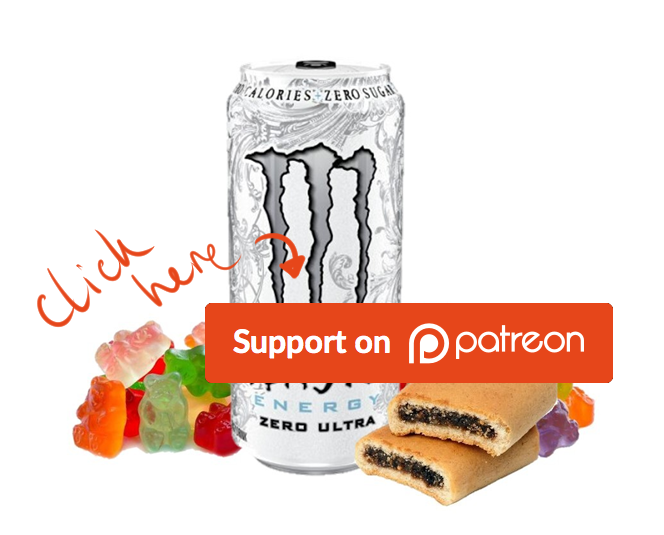
If you enjoyed this episode, please go to Apple Podcasts and leave us a review. That would help us beat the algorithms and help spread the enthusiasm to others by way of Break/Fix and GTM. Subscribe to Break/Fix using your favorite Podcast App:
Cindi Lux has to balance her busy race schedule with a demanding business schedule. As one of the leading program managers in the world heading up Lux Performance Group with her husband Fred she gets to premiere new product lines to the automotive media dozens of times a year. And if that wasn’t enough she’s involved in overseeing a multitude of racing school programs, and a family of dealerships.
To learn more about Cindi be sure to logon to www.cindilux.com or follow her on social media @cindilux on Instagram, Facebook and Twitter, and you can always connect with her on LinkedIn.
Craziest Moment on Track?
Cindi has no fear, and she’s quote as saying “I don’t know when to say no” – but how about coaching a Blind driver around the Portland International Raceway?
Support Women In Motorsports North America (WIMNA)
Women in Motorsports North America is a community of professionals devoted to supporting opportunities for women across all disciplines of Motorsport by creating an inclusive, resourceful environment to foster mentorship, advocacy, education, and growth, thereby ensuring the continued strength and successful future of our sport.


